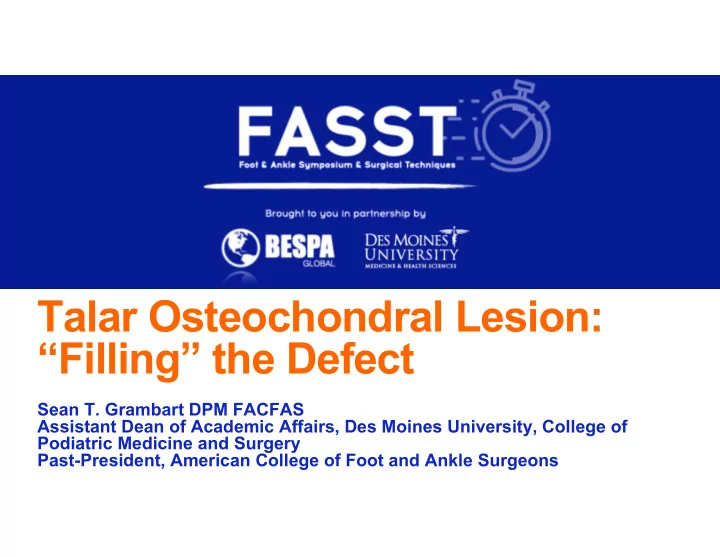

Talar Osteochondral Lesion: “Filling” the Defect Sean T. Grambart DPM FACFAS Assistant Dean of Academic Affairs, Des Moines University, College of Podiatric Medicine and Surgery Past-President, American College of Foot and Ankle Surgeons
Disclosure • Partner, BESPA Global • Orthosolutions, Design Team Member • ACFAS, Speaker
Microfracture in the Treatment of Osteochondral Lesion of the Talus
Prognosis Prognosis The American Journal of Sports Medicine 2020
Prognosis Prognosis • Good functional outcomes and improved quality of life according to FAOS, AOFAS, SF-36, and VAS were maintained after arthroscopic microfracture and did not deteriorate at a mean follow-up of 6.7 years. The American Journal of Sports Medicine 2020
Prognosis Purpose • Clinical and radiographic outcomes of arthroscopic debridement and microfracture for osteochondral lesions of the talus Methods • 82 patients • Mean defect size was 1.7 ± 0.7 cm2 • Arthroscopic debridement and microfracture for osteochondral lesions • Minimum 5-year follow-up Knee Surg Sports Traumatol Arthrosc (2016) 24:1299–1303
Prognosis Results • Mean preoperative AOFAS score was 58.7 ± 5.2 (49–75) • Mean post-operative AOFAS score was 85.5 ± 9.9 (56– 100) • At the last follow-up, 35 patients (42.6%) had no symptoms • 19 patients (23.1%) had pain after walking more than 2 h or after competitive sports activities • Radiological assessments showed 27 patients (32.9%) had a one-stage increase in their arthrosis level Knee Surg Sports Traumatol Arthrosc (2016) 24:1299–1303
Are We Missing Something??
Diagnosis Planning • 33 Ankle with OLTs • All had MRI and CT • With or Without Bone sclerosis • Area of Bone Marrow Lesion • 20 ankles had biopsy of the OLT • 13 ankles were evaluated
Diagnosis Planning • Large area of BML exhibited low degeneration of cartilage • Small area of BML indicated sclerosis of the subchondral bone with severe degeneration of the cartilage
Purpose Optimal drilling depth and direction for OCD of the talus Methods 12 cadaver tali perfused with a contrast agent and then scanned with a micro CT Arthroscopy: The Journal of Arthroscopic and Related Surgery, Vol 35, No 10 (October), 2019
Raikin, SM; Elias, I; Zoga, AC; et al. Osteochondral lesions of the talus: localization and morphologic data from 424 patients using a novel anatomical grid scheme. Foot Ankle Int. 28(2):154–61, 2007
Techniques Arthroscopy: The Journal of Arthroscopic and Related Surgery, Vol 35, No 10 (October), 2019
Techniques Arthroscopy: The Journal of Arthroscopic and Related Surgery, Vol 35, No 10 (October), 2019
Should we be adding something??
Surgical Augmentation • Prospective Cohort Study • 52 Patients in Microfracture • 49 Patients in Microfracture/BMAC • Minimum of 36 months follow up Foot and Ankle Surgery 25, 2019
Surgical Augmentation Microfracture Group • 28.8% Re-operation Rate Microfracture Group/BMAC • 12.2% Re-operation Rate Foot and Ankle Surgery 25, 2019
Do I/We need to have more patience?
Healing • 64 patient that underwent arthroscopic microfracture • Minimum 3 year follow up
Healing • “In patients with OLT treated with successful arthroscopic microfracture, it would be reasonable to determine the final outcome at least after 2 years”
Take Home Points 1. Pre-op Imaging 2. Drilling the Proper Depth 3. Giving it Time to Heal
Surgical Pearls/Q&A Thank You! We want your feedback! Results from the evaluation will be used in the planning of future FASST conferences. The evaluation URL was provided in the email you received on Thursday and can be found in the Q&A box. Certificates will be available for download by 5 pm CT on Monday, July 27. Instructions on how to access your certificate can be found on the conference materials website.
Recommend
More recommend